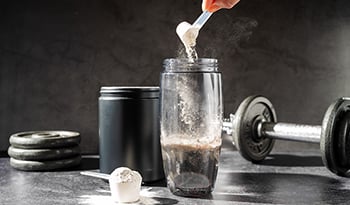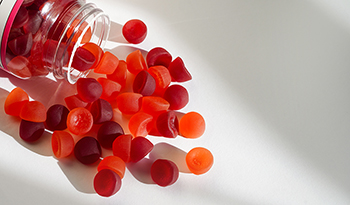Parhaat 5 lisäravinteita lihasten kasvulle

Miksi lihasten kasvu on tärkeää
Ammattimaiset kehonrakentajat eivät ole ainoita, jotka haluavat rakentaa lihaksia. Kaikki, lukion urheilijoista vanhuksiin, ovat kiinnostuneita lihasmassan ja toiminnan lisäämisestä. Kaikki urheiluun osallistuvat saavat ajatuksen. Ikääntyessämme alamme menettää lihasmassaa. Kaikkien yli 40-vuotiaiden on aloitettava lihasmassaansa rakentaminen tai ainakin ylläpito. Lihaksen menetys voi johtua myös vammasta, sairaudesta ja pitkäaikaisesta passiivisuudesta.
Lihasten menetys voi aiheuttaa vaikeuksia jokapäiväisissä tehtävissä, kuten siivouksessa, ostoksissa ja jopa yksinkertaisesti kävelyssä. Vähentynyt lihasvoima voi myös estää kykyäsi toipua vammasta tai sairaudesta. Lisäksi lihasten menetys voi vaikuttaa vaarallisiin putoamisiin, mikä johtaa mahdolliseen vammaisuuteen tai kuolemaan.
Olitpa sitten urheilija, nuori aikuinen, joka haluaa näyttää hyväkuntoiselta, keski-ikää lähestyvä vanhempi tai orastava eläkeläinen, lihasmassan rakentamisen ja ylläpitämisen tulisi olla terveytesi ja pitkäikäisyytesi ensisijainen tavoite. Vaikka kehonrakennus ja painonnosto ovat tehokkaita, ne eivät ole ainoa tapa lisätä lihasmassaa.
Yhdistelmä voimaharjoittelua ja luonnollisia lisäravinteita voisi olla paras kaksikko saavuttaaksesi etsimäsi lihasrakentamistulokset missä iässä tahansa.
Top 5 lisäravinteita lihaskasvuun
Tässä keskustelemme viidestä parhaasta lisäravinteesta lihaskasvuun.
1. Kreatiini
Solujen energiantuotannon avainkomponentti, kreatiini on aminohappo, jota esiintyy luonnollisesti kehossa. Ensisijaisesti aivoissa ja lihaksissa esiintyvä kreatiini saadaan enimmäkseen elintarvikkeista, kuten punaisesta lihasta ja äyriäisistä, kuten lohesta ja sillistä, ja pienempiä määriä löytyy kanasta ja turskasta. Keho tuottaa kuitenkin kreatiinia päivittäin maksassa, munuaisissa ja haimassa. Lihakset käyttävät kreatiinia tuottamaan enemmän energiaa.
Kreatiini ei ainoastaan tuota enemmän energiaa, vaan se voi myös lisätä vesipitoisuutta ja IGF-1-hormonia, mikä voi edistää lihasten kasvua. Kreatiinilisäaineen ottaminen voi lisätä tämän lihaksia rakentavan aminohapon tasoa jopa 40%.
Useiden tutkimusten kattava katsaus osoittaa, että kreatiinilisät ovat tehokkaita yläraajojen vahvuussuorituskyvyssä alle kolme minuuttia kestävässä harjoituksessa riippumatta väestön ominaisuuksista, harjoitusprotokollista ja lisäannoksista tai kestosta.
Muut tutkimukset ovat osoittaneet, että kreatiini yhdistettynä liikuntaan voi auttaa lisäämään lihasmassaa ja parantamaan urheilullista suorituskykyä. Urheilun ja liikunnan parantamisen lisäksi tutkimukset ovat osoittaneet, että kreatiinilisäys voi parantaa harjoituksen jälkeistä palautumista, vammojen ehkäisyä, lämmönsäätelyä, kuntoutusta ja aivotärähdystä ja/tai selkäytimen neuroprotektiota.
Useita kreatiinilisän kliinisiä sovelluksia on tutkittu neurodegeneratiivisiin sairauksiin, kuten lihasdystrofiaan, Parkinsonin ja Huntingtonin tautiin, sekä diabetekseen, nivelrikkoon, fibromyalgiaan, ikääntymiseen ja raskauteen. Nämä tutkimukset tarjoavat suuren määrän todisteita siitä, että kreatiini voi paitsi parantaa harjoituksen suorituskykyä, myös vaikuttaa vamman vakavuuden ehkäisyyn ja/tai vähentämiseen, vammojen aiheuttaman kuntoutuksen parantamiseen ja urheilijoiden auttamiseen sietämään raskaita harjoitusohjelmia.
Tutkijat ovat myös tunnistaneet useita kreatiinilisäyksen mahdollisesti hyödyllisiä kliinisiä etuja. Nämä tutkimukset osoittavat, että lyhyt- ja pitkäaikainen lisäys (enintään 30 g/vrk 5 vuoden ajan) on turvallista ja hyvin siedettyä terveillä yksilöillä. Turvallisuus ja teho osoitettiin myös monissa potilasväestöryhmissä imeväisistä vanhuksiin. Lisäksi merkittäviä terveyshyötyjä voidaan tarjota varmistamalla tavanomainen alhainen kreatiinin nauttiminen ruokavaliosta (3 g/vrk) koko elinkaaren ajan.
Jos lihaskasvu, vammojen korjaus tai parantunut lihassuorituskyky ovat tehtävälistallasi, kreatiini voi olla täydellinen lisä päivittäiseen rutiiniisi. Sen uskotaan olevan ehkä paras lisäosa lihasten kasvulle.
2. Beetahydroksi-beeta-metyylibutyraatti (HMB)
Jos olet aloittelija painonharjoittelija tai olet vasta aloittamassa lihaskasvuohjelmaa, HMB voi olla oikea lisäravinne sinulle. Leusiinin aineenvaihdunnan sivutuote, HMB voi olla välttämätön lihasproteiinien hajoamisen vähentämiseksi. Tämä HMB: n lihaksia ylläpitävä toiminto voi auttaa ylläpitämään lihasmassaa ja vähentämään lihasten menetystä.
Tutkimukset osoittavat, että yhdistettynä painoharjoitteluun HMB:tä käyttävät kouluttamattomat aikuiset voivat parantaa vähärasvaisen kehon massan nousua. Päinvastoin, muut tutkimukset osoittavat, että HMB-lisäys on todennäköisesti tehotonta lisäämään lihasmassaa aikuisilla, jotka ovat vakiintuneita urheilijoita tai joilla on kokemusta painoharjoittelusta.
Uutena painonharjoittelijana HMB voisi olla täydennys, joka auttaa sinua pääsemään loistavaan alkuun lihaskasvutavoitteidesi saavuttamisessa.
3. Proteiinijauheet
Suosittu proteiinilähde nykypäivän yhteiskunnassa, proteiinijauhelisät voivat tarjota huomattavan määrän proteiinia ruokavaliossasi. Proteiini on valmistettu aminohapoista, lihaskudoksen rakennuspalikoista. Proteiinijauheet voivat tulla joko kasvi- tai eläinlähteistä. Eläimet, kuten lehmät ja norsut, saavat kaiken proteiininsa kasveista. On väärinkäsitys, että meidän on syötävä eläimiä saadaksemme tarpeeksi proteiinia.
Lehmien osalta kaseiini- ja heraproteiinijauheet ovat melko suosittuja ja ne on valmistettu lehmänmaidosta. Tätä proteiinilähdettä ei suositella niille, joilla on maitoallergioita tai herkkyyksiä. Munanvalkuainen on vaihtoehtoinen jauhe lehmänmaitoproteiinille, joka on valmistettu myös eläinperäisestä lähteestä.
Kasvipohjaisia proteiinijauheita valmistetaan useista kasvilähteistä, mukaan lukien riisi, hampu, soija, herne, levät, kurpitsansiemenet, kikherneet ja quinoa.
Tutkimukset ovat osoittaneet, että proteiinijauheen lisäys voi auttaa ylläpitämään lihasmassaa ja edistämään lihasten kasvua. Tämä pätee, vaikka olisit laihtumisruokavaliolla. Tutkimukset viittaavat siihen, että vastustuskykyharjoituksen yhdistäminen proteiinijauheen lisäykseen voi parantaa palautumista, parantaa fyysistä suorituskykyä ja edistää lihasten kasvua.
Lisätutkimuksissa havaittiin, että vastustusharjoituksen keston, tiheyden ja määrän kasvaessa proteiinilisä voi edistää lihasten kasvua ja lisätä lihasvoiman kasvua sekä kouluttamattomilla että koulutetuilla henkilöillä. Todisteet viittaavat myös siihen, että proteiinilisä voi nopeuttaa sekä aerobisen että anaerobisen tehon paranemista.
Toinen proteiinilisäyksen etu on, että kohonneet veren aminohappotasot voivat indusoida lihassynteesiä. Haluatko lisätä lihasten kasvua? Proteiinijauhelisä voi olla juuri sinulle sopiva.
4. Painonnostajat
Jos sinulla on vaikeuksia saada tarpeeksi kaloreita ruokavalioon, painonnousut voivat olla osa ratkaisua. On useita syitä, miksi ihmiset eivät ehkä pysty saamaan riittävästi kaloreita päivittäin, mukaan lukien sairaus, vamma, vamma, ruokahaluttomuus, korkea aktiivisuustaso tai kiireinen aikataulu.
Tutkimukset osoittavat, että fyysisesti passiiviset aikuiset voivat lisätä vähärasvaista lihasmassaa lisääntyneellä kalorien saannilla. Näiden tulosten saavuttamiseksi olisi vielä kulutettava riittävästi proteiinia. Painonnostajat ovat pääasiassa hiilihydraatteja; niissä on kuitenkin tyypillisesti 20-60 grammaa proteiinia ja ne tarjoavat tyypillisesti noin 1000 kaloria annosta kohti.
Lisätutkimukset osoittavat päinvastaisen vaikutuksen aikuisilla, jotka ovat aktiivisia painonharjoittajia. Tämän väestön osalta painonnousujen kulutus ei välttämättä vaikuta vähärasvaisen lihasmassan kasvuun.
Jos olet passiivinen ja kamppailet saadaksesi riittävästi kaloreita ja proteiinia, painonnousut voivat olla ihanteellinen vaihtoehto sinulle, jos haluat lisätä lihasten kasvua.
5. Beta-alaniini
Myös aminohappo, beeta-alaniini, voi auttaa parantamaan lihasten kasvua yhdessä harjoitusrutiinin kanssa. Tutkimuksella on ristiriitaisia tuloksia.
Tutkimuksessa havaittiin, että beeta-alaniini yhdistettynä korkean intensiteetin intervalliharjoitteluun lisäsi vähärasvaista kehon massaa kilolla enemmän kuin lumelääke. Toinen tutkimus osoitti, että beeta-alaniinin ottaminen kahdeksan viikon ajan lisäsi laihaa kehon massaa yliopistourheilijoilla, mukaan lukien jalkapalloilijat ja painijat, verrattuna lumelääkkeeseen.
Muissa tutkimuksissa on havaittu, että beeta-alaniini ei parantanut lihasmassaa annoksesta riippumatta tai yhdistettynä painoharjoitteluun. Vaikka tutkimustulokset ovat ristiriitaisia, beeta-alaniini voi olla kokeilemisen arvoinen, jos haluat rakentaa lihasmassaa harjoitusrutiinin yhteydessä.
Iso kuva
Halusitpa sitten kasvattaa lihasmassaa kuntoa varten tai ylläpitää lihasten toimintaa, lihaskasvulisä on oikea sinulle. Saatat joutua rakentamaan lihaksia tai vähentämään ikääntymisen tai vamman aiheuttamaa lihasmenetystä, tai ehkä olet kehonrakentaja. Joka tapauksessa nämä viisi lisäravinnetta voivat tuoda sinulle etsimäsi lihaskasvun.
Vaikka proteiinijauheita pidetään yleensä hyvin siedettyinä ja turvallisina, niillä on joitain riskejä. Munuaisvaurio tai paheneva munuaissairaus voi johtua liiallisesta proteiinista ruokavaliossasi. Sydänsairauksien riski voi lisääntyä, koska proteiinilisät voivat nostaa huonoa (LDL) kolesterolitasoa ja nostaa verenpainetta.
Lisättyjen sokerien vuoksi ei-toivottu painonnousu ja verensokeripiikit voivat liittyä myös proteiinijauheisiin. Raskasmetallien saastuminen on myös ollut huolenaihe sen jälkeen, kun vuoden 2018 tutkimuksessa todettiin, että lähes kaikki suositut proteiinijauheet sisälsivät raskasmetalleja ja toksiineja.
Ota aina yhteys lääkäriisi tai valtuutettuun terveydenhuollon tarjoajaan ennen proteiinilisärutiinin aloittamista.
Lähteet:
- Bray GA, Smith SR, de Jonge L, et ai. Ruokavalion proteiinipitoisuuden vaikutus painonnousuun, energiankulutukseen ja kehon koostumukseen ylensyönnin aikana: satunnaistettu kontrolloitu tutkimus [julkaistu korjaus ilmestyy julkaisussa JAMA. 2012 14. maaliskuuta; 307 (10) :1028]. JAMA. 2012; 307 (1): 47-55. doi: 10.1001/jama.2011.1918
- Cermak NM, Res PT, Great LC, Saris WH, van Loon LJ. Proteiinilisä lisää luustolihaksen adaptiivista vastetta resistenssityyppiseen harjoitteluun: meta-analyysi. Olen J Clin Nutr. 2012; 96 (6): 1454-1464. doi: 10.3945/ajcn.112.037556
- Damoon Ashtary-Larky, Reza Bagheri, Matin Ghanavati, Omid Asbaghi, Alexei Wong, Jeffrey R.Stout & Katsuhiko Suzuki (2022) Beeta-alaniinilisäyksen vaikutukset kehon koostumukseen: luokan arvioitu systemaattinen katsaus ja meta-analyysi, Journal of the International Sports Nutrition Society, 19:1, 196-218, DOI: 10.1080/15502783.2022.2079384
- Hector AJ, Marcotte GR, Churchward-Venne TA, et ai. Heraproteiinilisä säilyttää aterianjälkeisen myofibrillaarisen proteiinisynteesin lyhytaikaisen energiarajoituksen aikana ylipainoisilla ja lihavilla aikuisilla [julkaistu korjaus ilmestyy julkaisussa J Nutr. 2015 Jun; 145 (6) :1373]. Jutr. 2015; 145 (2): 246-252. doi: 10.3945/jn.114.200832
- Holeček M. Beeta-hydroksi-beeta-metyylibutyraattilisäys ja luurankolihakset terveissä ja lihaksia tuhlaavissa olosuhteissa. J Cachexia Sarcopenia Muscle. 2017; 8 (4): 529-541. doi: 10.1002/jcsm.12208
- Kreider RB, Kalman DS, Antonio J, et ai. International Society of Sports Nutrition -kanta: kreatiinilisäyksen turvallisuus ja tehokkuus liikunnassa, urheilussa ja lääketieteessä. J Int Soc Urheilu Nutr. 2017; 14:18. Julkaistu 2017 13. kesäkuuta doi:10.1186/s12970-017-0173-z
- Lanhers C, Pereira B, Naughton G, Trousselard M, Lesage FX, Dutheil F.Kreatiinilisäys ja yläraajojen voimakkuuden suorituskyky: järjestelmällinen katsaus ja meta-analyysi. Sports Med. 2017; 47 (1): 163-173. doi: 10.1007/s40279-016-0571-4
- Longland TM, Oikawa SY, Mitchell CJ, Devries MC, Phillips SM. Korkeampi verrattuna alhaisempaan ruokavalion proteiiniin energiavajeen aikana yhdistettynä intensiiviseen liikuntaan edistää suurempaa vähärasvaisen massan nousua ja rasvamassan menetystä: satunnaistettu tutkimus. Am J Clin Nutr. 2016; 103 (3): 738-746. doi: 10.3945/ajcn.115.119339
- Morton RW, Murphy KT, McKellar SR, et ai. Systemaattinen katsaus, meta-analyysi ja meta-regressio proteiinilisän vaikutuksesta vastustuskykyharjoittelun aiheuttamaan lihasmassan ja voiman kasvuun terveillä aikuisilla [julkaistu korjaus ilmestyy julkaisussa Br J Sports Med. 2020 lokakuu; 54 (19): e7]. Br J Sports Medical 2018; 52 (6): 376-384. doi: 10.1136/bjsports-2017-097608
- Passion SM, McLellan TM, Lieberman HR. Proteiinilisien vaikutukset lihasmassaan, voimaan sekä aerobiseen ja anaerobiseen voimaan terveillä aikuisilla: järjestelmällinen katsaus. Sports Medical 2015; 45 (1): 111-131. doi: 10.1007/s40279-014-0242-2
- Sanchez-Martinez J, Santos-Lozano A, Garcia-Hermoso A, Sadarangani KP, Cristi-Montero C.Beeta-hydroksi-beeta-metyylibutyraattilisäyksen vaikutukset vahvuuteen ja kehon koostumukseen koulutetuilla ja kilpailevilla urheilijoilla: Meta-analyysi satunnaistetuista kontrolloiduista tutkimuksista. J Sci Med Sport. 2018; 21 (7): 727-735. doi: 10.1016/j.jsams.2017.11.003
- Länsi-DW, Burd NA, Coffey VG, et ai. Nopea aminohappemia parantaa myofibrillaarista proteiinisynteesiä ja anabolisia lihaksensisäisiä signalointivasteita resistenssiharjoituksen jälkeen. Olen J Clin Nutr. 2011; 94 (3): 795-803. doi: 10.3945/ajcn.111.013722
- Länsi-DWD, Abu Sawan S, Mazzulla M, Williamson E, Moore DR. Heraproteiinilisä parantaa koko kehon proteiinien aineenvaihduntaa ja suorituskyvyn palautumista vastustusharjoituksen jälkeen: kaksoissokkoutettu crossover-tutkimus. Ravinteet. 2017; 9 (7) :735. Julkaistu 2017 11. heinäkuuta doi:10.3390/nu9070735
- Witard OC, Jackman SR, Breen L, Smith K, Selby A, Tipton KD. Myofibrillaarinen lihasproteiinisynteesi nopeutuu aterian jälkeen vasteena lisääntyville heraproteiiniannoksille levossa ja vastustusharjoituksen jälkeen. Am J Clin Nutr. 2014; 99 (1): 86-95. doi: 10.3945/ajcn.112.055517
VASTUUVAPAUSLAUSEKE:Tämän hyvinvointiblogin tarkoituksena ei ole tarjota diagnooseja...
















































































 Sisällysluettelo
Sisällysluettelo















